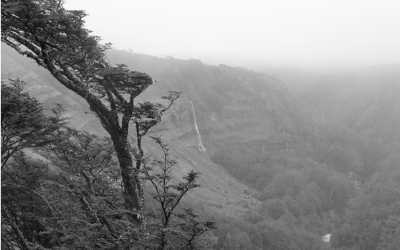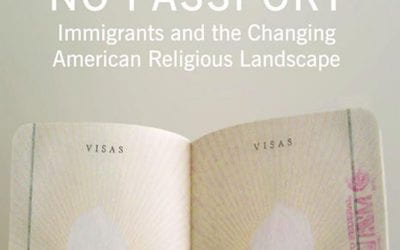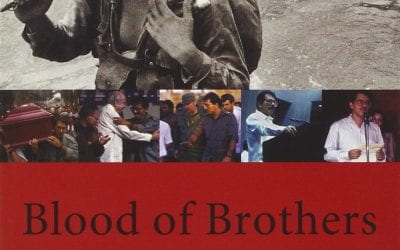A Green Classroom
Puerto Rico in Winter

Children participate in workshops on urban ecology run by community members, many of them parolees and probationers. Photo courtesy of Civil Action and Ecucation Corp.
“Aula Verde” is the name of an ecological park and science center for school children in Puerto Rico. It was an appropriate visit for the third Puerto Rico Winter Institute, dedicated to water and plants and directed by Harvard biology professor N. Michele “Missy” Holbrook. The amphitheater-like design of the flora, to facilitate viewing in lessons by the practiced guides, and the elegant simplicity of the laboratory building that borders the butterfly farm and dedicates space for arts and crafts with skilled mentors, were all quite pleasing to Missy’s experienced eye, but not astounding for the well-traveled botanist until we learned how the park was developed. It’s a story of recycled resources and civic revival.
Marco Abarca, a creative Costa Rican human rights lawyer, had been called in to consult on an ongoing class-action lawsuit against unconstitutional prison conditions in Puerto Rico. Abarca, a law professor at the University of Puerto Rico (UPR), managed to direct part of the fine monies accumulated throughout years of litigation toward an investment that would improve the living conditions in one of the largest and poorest housing projects in Puerto Rico. Abarca together with community participants, consisting of parolees and probationers, began to transform the mosquito-infested badland behind the Catholic school into a natural haven. Then, with the help science educators, the group designed a workshop for elementary school children on urban ecology. As the participants organized, what developed was a community-based, self-employed enterprise known as Aula Verde. Its expert workshops are certified by the Department of Education of Puerto Rico and supported with Title I funds for the approximately 12,000 elementary school children who visit each year. By now the concept of “Aula Verde” is an inspiration for other consolidated sustainable development initiatives that can significantly improve lives in marginalized communities and at the same time enhance the education of Puerto Rico’s youth.
The project has salutary side effects in the academy as well. Abarca’s UPR law students work together with the community participants of Aula Verde to develop research that stretches the range of community improvement efforts to social concerns such as adolescent pregnancy, breast-feeding, school retention and prevention of drug abuse. Collaborative research prepares students to make effective interventions in all these areas, as evidenced by the support garnered in several non-profit organizations that have formed a tight network to promote this community’s development on various fronts.
The name, Green Classroom, also captures a general spirit of the island as a haven for learning, especially in winter, through collaborations across faculties and student bodies that might otherwise stay unknown to one another. For the past four years during the month of January. Harvard students and professors have been leaving the black, white, and grey winter of Boston to land in the full color of Puerto Rico to join colleagues and classmates there in order to learn from one another.
The small island measures about 100 by 35 miles but has over 20 ecosystems making it a virtual laboratory for life sciences, as we learned during the inaugural 2004 Winter Institute on a tour of the vast and impressive UPR Botanical Gardens in Río Piedras. The island also condenses many of the social, cultural, public health and ecological issues that count on local expertise and that also claim our general attention today in major universities throughout the Americas. Like a time-tunnel for Latin American countries that have recently entered the economic force-field of the United States through negotiated but uneven treaties, Puerto Rico could look like a laboratory and teach a lesson about what is gained and what is lost when circulation (of monies, goods, and people) trumps sovereignty. Since the 1950s, while Latin American economies were busy building local industry through Import Substitution Industrialization, Puerto Rico was a pioneer in attracting outside investment. The models developed there for over half a century are now being implemented throughout Latin America.
Nevertheless, Puerto Rico is usually overlooked or relegated to someone else’s field of study, unless the focus is specifically on the island in a book, or a course, or a lecture often by Puerto Rican scholars themselves. Other academics can’t quite place the territory and tend conveniently to ignore it. North Americanists seem consider it Latin American and therefore out of bounds; and Latin Americanists have apparently put it close to the United States where their field tapers off into another domain. Caribbeanists are likely to focus on Cuba as representative of the Spanish speaking area; and post-colonial studies can’t quite include Puerto Rico’s pre-post “Commonwealth” status, especially when its oxymoronic structure comes out clearly in Spanish as “Estado libre asociado.” Juan Flores calls the condition “Lite Colonial.”
Puerto Rico is a hybrid of cultures and of conflicting political identities counterpoised in a seemingly delicate but somehow enduring balance. The complicated island consistently performs the counterpoint and edgy creativity that theorists have described as either quintessentially Caribbean (read Cuban) according to Fernando Ortiz, or as distinctly borderland (between Mexico and the United States) to follow Néstor García Canclini. Puerto Rico’s complexity might have been exemplary for their theories, but perhaps it goes deeper than they were prepared to imagine. Contradiction is official in Puerto Rico as well as commonplace. To be both a “free state” and an “associated” or dependent territory would appear untenable and can be ontologically unnerving. Yet the duality has promoted admirable agility and a tolerance for contradiction, even while it strains the emotional resilience that the situation demands. A glaring example is the legitimate complaint that although Puerto Ricans cannot vote in presidential elections, they are drafted under presidential leadership into the United States Army at an alarmingly high rate, from the Korean War through Viet Nam, and serve disproportionately in today’s Iraq war. Less notorious but just as revealing an example of contradiction are the two separate legal traditions that lawyers generally command in Puerto Rico: the Civil Law tradition, which combines German and French positive law inherited from a reformed Spanish Empire, and the United States Common Law tradition that imposed its own adversarial procedures (vs. the older inquisitorial approach) without objecting to the substantive claims of the Civil Law tradition. Cases are generally argued in Spanish, unless they go before the United States District Court in Puerto Rico, in which case they must be argued in English. This leveling of differences between legal systems has prepared Puerto Rican lawyers to consult for other Latin American countries that feel the pressure to adopt United States legal procedure in order to facilitate economic accords. But the “homogenization” of differences in Puerto Rico should look like a limit case for countries that are testing the boundaries of treaty-friendly “harmonization” that promises to recognize the legitimacy of different legal systems despite asymmetries of economic and political power. The island remains a microcosm and classroom for this challenge today, as the national law of sovereign states rubs against demands of other states and of international conventions and courts.
The island’s unsettled political status doesn’t amount to an identity crisis—Puerto Ricans are generally proud to beboricuas—but it does provoke noteworthy resourceful responses that combine elements of Anglo and Hispano along with other immigrant worlds and that sometimes retrieve older indigenous traditions, making the island a fascinating focus for scholarship and for enduring friendships. This became clear to me when I started to travel to San Juan, following the pattern of my Brooklyn barrio neighbors from childhood. It was also clear that almost anyone would come to the same conclusion about the intellectual and personal pull of Puerto Rico once they got there. And Puerto Ricans would benefit from the visits too, as my friend Rubén Ríos Avila explained. UPR students are homogeneously almost all from the island and hardly get exposed to unfamiliar points of view, so that the interchange of perspectives is not only welcome but fundamental for a critical education. Bringing Harvard colleagues and graduate students to share seminar experiences with Puerto Rican counterparts became a project I took on with enthusiasm and with confidence about the promising results. The project began through the Cultural Agents Initiative, as I explored sites and partners in Old San Juan where visitors would inevitably feel drawn, and it was adopted by the David Rockefeller Center for Latin American Studies once the design could be implemented as a program, thanks to support by the Wilbur Marvin Foundation.
From the beginning, our collaboration has counted on the hospitality of the Escuela de Artes Plásticas—where the Institute holds its classes across from the magnificent Morro Fort and the Atlantic Ocean; the Centro de Estudios Avanzados de Puerto Rico y el Caribe—where Harvard students and some faculty stay in the old seminary’s student rooms behind the peaceful cloistered patio; and the University of Puerto Rico, our close partner in academic planning and staffing, through the initiative of Silvia Álvarez Curbelo, a professor and former DRCLAS Visiting Scholar.
Our themes or areas of focus vary from year to year, intentionally, in order to engage the broadest possible range of students and scholars. Seminars and fieldtrips on arts and religion in the first year brought Tom Cummins, Davíd Carrasco and J. Lorand Matory to work with Enrique Vivoni, Angel Quintero, and Juan Flores. The next year, Arachu Castro, Dharma Cortes, and Dolores Acevedo-Garcia worked with Glorisa Canino and Jorge Duany on issues of public health. And in the third year Missy Holbrook accompanied by Maciej Zweniecki, Paul Moorcroft, Rafael Bras, Elvira Cuevas, Ernesto Medina, Carla Restrepo and Jorge Ortiz studied water and plants. Neuroscience and the ethics of empathy provided a context for Alice Flaherty to include Graham Ramsay and Doris Sommer in partnerships with Margarita Alegría, Marco Abarca and Antonio Martorell in the recent fourth year of the Winter Institute. Next year we hope to engage colleagues in economics or the law. Topics change, but the collaborative model remains constant. Three, sometimes four, faculty members from Harvard join an equal number of professors from the University of Puerto Rico to alternate their lectures and presentations between visiting and local professors for a dozen graduate students from each institution. Through this design Puerto Rico is as a partner for Harvard’s scholarly engagements in ways that can foment sometimes lasting exchanges or dialogues. The two-way and mutual model of the Institute probably distinguishes it from other approaches to scholarship abroad. Most either host a Harvard professor with his or her students in a country appropriate to their course material; or they engage Harvard faculty to teach in foreign universities. Some students study abroad too, often during summers, but very few choose to substitute a semester or a year at Harvard for a term elsewhere. The Winter Institute takes advantage of down-time in the dead of winter not only to identify Puerto Rico as an appropriate site for the study of many fields; it also recognizes Puerto Ricans as colleagues and mentors across a range of academic disciplines.
Spring 2008, Volume VII, Number 3
Doris Sommer is Ira and Jewell Williams Professor of Romance Languages and literatures and of African and African American Studies at Harvard University. She is also Director of Cultural Agents (culturalagents.org). She thanks Professor Abarca for his help with this article and for providing photos.
Related Articles
Editor’s Letter: Puerto Rico
Long, long ago before I ever saw the skyscrapers of Caracas, long before I ever fished for cachama in Barinas with Pedro and Aída, long before I ever dreamed of ReVista, let alone an issue on Venezuela, I heard a song.
God Needs No Passport
For a practicing Buddhist, my first Mass attendance at St. Ambrose two years ago was a memorable event. I had spent the earlier part of the day visiting…
Blood of Brothers: Life and War in Nicaragua
Stephen Kinzer, New York Times Bureau Chief in Nicaragua for most of the war years, pauses in his compelling account of the war and its politics to explain the Socratic method needed to give…




